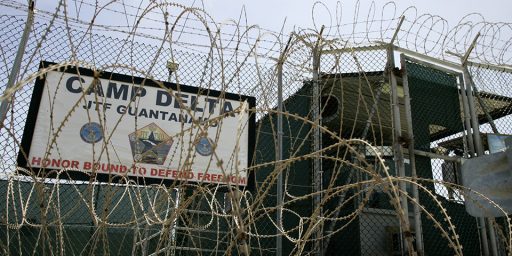Abu Ghraib Roundup
Several stories in the major papers today shed additional light on this scandal, although new questions are raised as well.
We have more confirmation that gaining information took priority over humane treatment of prisoners, at least in certain circumstances:
Boston Globe — General Says He Backed Interrogation Limits*
The American general who commands the facility at the center of the prison-abuse scandal said yesterday that he tried last summer to set limits to US military interrogation techniques in Iraq, including suggestions that soldiers stop using practices that appeared to violate the Geneva Conventions.
“There were growing errors, errors we made in good faith,” Major General Geoffrey Miller said in an interview inside the prison officers’ mess hall yesterday. “They were developing their procedures, teaching young leaders how to do a very difficult mission and do it correctly.”
Miller commanded the US military’s top-secret detention center for terror suspects at Guantanamo Bay in Cuba until this year. He arrived in Iraq last month to take control of the massive detention operation, in which about 40,000 Iraqis have been arrested since Saddam Hussein’s defeat 13 months ago.
Since the controversy erupted three weeks ago, critics have questioned whether Miller might have set the stage for the shocking abuses by issuing recommendations in a report to top American commanders last summer. In it, Miller said commanders could get better intelligence from detainees if military police were able to “set the conditions” for interrogations by military intelligence officers.
***
Miller denied he had suggested highly aggressive tactics to get prisoners to offer information about the growing insurgency in Iraq. Instead, he said he suggested “taking off the list of techniques” several tactics used with detainees in US military custody. Those included punishing people by changing their diet, and forcing them to assume painful positions for lengthy periods.
The New York Times reported today that Colonel Thomas M. Pappas, the American officer who was in charge of interrogations at Abu Ghraib, told a senior Army investigator that intelligence officers sometimes instructed the military police to force Iraqi detainees to strip naked and to shackle them before questioning them.
Pappas acknowledged to Major General Antonio M. Taguba that his unit, the 205th Military Intelligence Brigade, had “no formal system in place” to monitor instructions they had given to military guards, who worked closely with interrogators to prepare detainees for interviews.
Pappas said he “should have asked more questions, admittedly” about abuses committed or encouraged by his subordinates. Portions of his sworn statements were read to the Times, the paper said, by a government official.
Meanwhile, Miller also denied that the Pentagon had a “black” operation for high-value detainees, in which interrogations are conducted without legal limitations. The “special access program” was first outlined in the May 24 edition of The New Yorker magazine yesterday, which cited unnamed intelligence agents. “The article in its whole is inaccurate,” said Miller, who said he had read it online Sunday night. “There is no special access program in Abu Ghraib.”
Still, we finally have testimony that clarifies the nature of the instruction given to the MPs:
NYT: M.P.’s Received Orders To Strip Iraqi Detainees [RSS]
The American officer who was in charge of interrogations at the Abu Ghraib prison has told a senior Army investigator that intelligence officers sometimes instructed the military police to force Iraqi detainees to strip naked and to shackle them before questioning them. But he said those measures were not imposed “unless there is some good reason.”
The officer, Col. Thomas M. Pappas, commander of the 205th Military Intelligence Brigade, also told the investigator, Maj. Gen. Antonio M. Taguba, that his unit had “no formal system in place” to monitor instructions they had given to military guards, who worked closely with interrogators to prepare detainees for interviews. Colonel Pappas said he “should have asked more questions, admittedly” about abuses committed or encouraged by his subordinates.
The statements by Colonel Pappas, contained in the transcript of a Feb. 11 interview that is part of General Taguba’s 6,000-page classified report, offer the highest-level confirmation so far that military intelligence soldiers directed military guards in preparing for interrogations. They also provide the first insights by the senior intelligence officer at the prison into the relationship between his troops and the military police. Portions of Colonel Pappas’s sworn statements were read to The New York Times by a government official who had read the transcript.
Testimony from guards and detainees at a preliminary hearing for a soldier accused of abuse said that orders from interrogators at Abu Ghraib had stopped short of the graphic abuse seen in the photographs at the center of the prison scandal.
The interrogation techniques Colonel Pappas described were used on detainees protected by the Geneva Conventions, which prohibit inhumane treatment of prisoners. Military officials said on Monday that the United States had months ago quietly abandoned an early plan to designate as unlawful combatants some of the prisoners captured by American forces in Iraq. No prisoners in Iraq were classified as unlawful combatants.
That means that even foreign fighters and suspected Al Qaeda members captured in Iraq, along with Iraqis captured as prisoners of war and insurgents, have remained protected by the Geneva Conventions.
The option of designating prisoners captured in Iraq as unlawful combatants “has not been foreclosed, but this is not under consideration,” a senior military official said.
NYT — Abuse At Prison Exceeded Directives, Some Guards Say [RSS]
Interrogators from military intelligence and other government agencies told guards at the Abu Ghraib prison to deprive detainees of sleep and food, and would strip detainees and make them sleep naked in their cells, but their orders stopped well short of the abuse at the center of the prison scandal, guards and investigators have testified at a preliminary hearing for one of the soldiers accused of abuse.
According to a transcript of the hearing for the soldier, Sgt. Javal S. Davis, witnesses said that there were written “sleep management plans” and eating plans and that military intelligence members would regularly take away detainees’ clothes.
But the testimony offered no evidence to back up what lawyers for the accused soldiers have said: that their clients were following orders when they threw naked detainees in a pile, stomped on their hands and feet, forced them to masturbate and photographed them.
“They would tell us to take away something from an inmate, like a pillow or something, to make him uncomfortable,” said Sgt. William Cathcart, a guard in the 372nd Military Police Company, the accused soldiers’ unit. “I would tell them to put it in writing. If I had sensed they wanted someone `roughed up,’ then I would have said something.”
The charges against Sergeant Davis include accusations that he jumped into a pile of detainees and stomped on their fingers and toes. “Policy is not to pile detainees on the floor,” Sergeant Cathcart said. “There is no policy to dive on a pile of detainees or physically assault detainees.”
A transcript of the hearing obtained by The New York Times suggests that interrogators gave guards orders to treat detainees harshly to get them to talk. But it leaves open questions about how far those instructions went and how precise they were, and how harsh the behavior was that they authorized.
Some witnesses testified that the orders had been only “implied,” others said they had been written. Other guards insisted that they had been told to create uncomfortable conditions for detainees, but not to treat them roughly, and that the soldiers accused of abuse went far beyond direct orders.
“No one asked us to soften or roughen up detainees,” said Sgt. Hydrue S. Joyner [No relation. -ed.], a guard with the 372nd. “Maybe `give them a little more attention.’ ”
But Sergeant Joyner said: “No one would have to tell me not to assault any detainees. No one would have to tell me to not allow masturbation. I would wholeheartedly want it to stop.”
“If M.I. told me to make detainees masturbate together,” he testified, referring to military intelligence, “I would cut off his air supply until he turned blue in the face. This is not acceptable instruction to me.”
This strikes me as convincing, as it comports with my experience with American soldiers. Contrary to the image portrayed in the movies, troops aren’t unquestioning automatons that just do what they’re told. They’re apt to question even perfectly legal orders that they consider stupid.
The most disturbing story comes from the LA Times — Death Of Prisoner Detailed In Testimony
When CIA officers took the Iraqi detainee to Abu Ghraib prison, his head was covered with an empty sandbag and Army guards were ordered to take him directly to a shower room that served as a makeshift interrogation center at the overcrowded, shell-damaged facility outside Baghdad.
An hour later, during intensive questioning by intelligence officers, the prisoner collapsed and died. Only then did interrogators remove the hood to reveal severe head wounds that had not been treated.
The dead prisoner, whose identity has not been made public, would become famous around the world through a photograph of a body wrapped in plastic sheeting and packed in ice — among the most indelible images yet made public in the Iraqi prisoner abuse scandal.
An account of his final hours, and of the failure to provide medical attention to a severely wounded prisoner, is contained in sworn statements provided to Army investigators by military police guards at Abu Ghraib.
After the man died, the documents say, officials argued over who was responsible for the body. Eventually, the body deteriorated to the point that it had to be disposed of.
***
In their testimony, Kenner and Brown agreed that the CIA had taken the prisoner to Abu Ghraib and ordered guards to take him to the interrogation center without removing the hood. They disagreed on who was involved in the subsequent questioning: Kenner said it was the CIA alone, while Brown said the CIA and military intelligence officers had worked together.
Both Kenner and Brown referred to the CIA by its commonly used pseudonym, the OGA, or Other Government Agency.
A CIA spokesman said Monday that he could not comment on the matter because it was under investigation by the agency’s inspector general’s office in conjunction with other military investigations.
In other testimony at the Davis hearing, guards said military intelligence officers routinely deprived prisoners of food, sleep, clothes, cigarettes and sometimes even sunshine, and expected guards to treat prisoners just as harshly or worse.
The Boston Globe reports that President Bush will address the nation on this scandal tonight.
*The userid/password combination otbblog/jamesotb will work for all the registration required articles.




